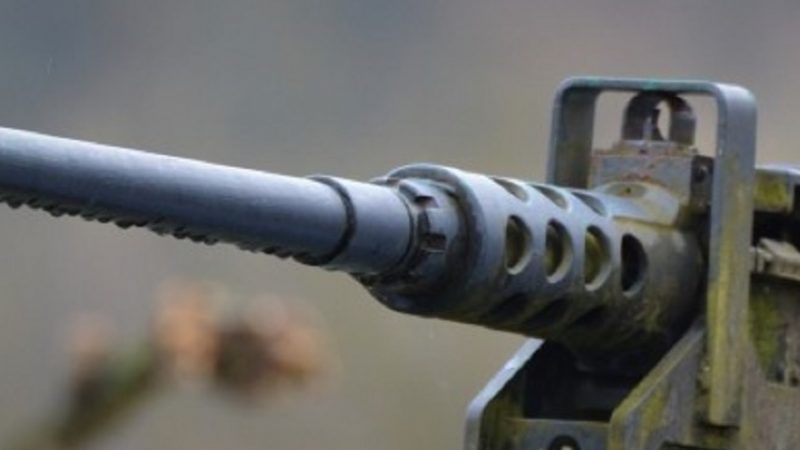Automatic Weapons Are Already Heavily Regulated and Gun Control Laws Don't Work
Laws aren't the solution you're looking for to crimes like the massacre in Las Vegas.

Stephen Paddock "appears to have used at least one fully automatic rifle" during his murderous rampage in Las Vegas, according to the Wall Street Journal. Let's tentatively accept that for the moment while recognizing, as Nick Gillespie has noted, that early reports in situations like this are often wrong. If true, though, it demonstrates the pointlessness of the predictable calls for tighter gun restrictions issued by the usual suspects. That's because automatic rifles—machine guns—have been tightly regulated at the federal level since 1934, and subjected to further restrictions since then.
The history of federal machine gun regulations is well-covered at the website of the Bureau of Alcohol, Tobacco, Firearms, and Explosives. Regulation began with the National Firearms Act of 1934, which imposed a $200 tax on the manufacture and transfer of "shotguns and rifles having barrels less than 18 inches in length, certain firearms described as 'any other weapons,' machineguns, and firearm mufflers and silencers" at the federal level (states and localities have always been free to impose their own restrictions). According to the ATF, "As the legislative history of the law discloses, its underlying purpose was to curtail, if not prohibit, transactions in NFA firearms."
The law was amended in 1968, and then again, in particular, in 1986. The latter revision was to "prohibit the transfer or possession of machineguns. Exceptions were made for transfers of machineguns to, or possession of machineguns by, government agencies, and those lawfully possessed before the effective date of the prohibition, May 19, 1986."
So for civilians, the only legally available automatic rifles in the United States under federal law come from the fixed pool of such weapons that existed on May 19, 1986. With a limited supply, shrinking at least a bit over time through attrition, prices for legal machine guns have no place to go but up. A glance at Gunbroker.com, an online listing service (with actual transfers handled by licensed dealers), reveals prices starting in four figures and rapidly going to five for individual weapons.
Purchasing and owning any NFA firearm, including automatic rifles/machine guns requires undergoing a background check and entering the weapon in the National Firearm Registration and Transfer Record, which is "the central registry of all NFA firearms in the U.S. which are not in the possession or under the control of the U.S. Government," according to the ATF National Firearms Act Handbook. This handbook is an excellent resource for familiarizing yourself with the federal regulation of automatic rifles/machine guns and other NFA firearms. You might want to put aside some time if you decide to peruse it since, including preface and appendices, the book is 220 pages long.
Which is to say, short of outright prohibition, automatic rifles are subject to just about every rule and restriction that has been proposed by opponents of easy civilian possession. If the weapon Paddock used in his rampage was legally acquired and owned, it was done so in accordance with laws intended "to curtail, if not prohibit, transactions" in such firearms in the words of federal regulators themselves.
But what if Paddock's weapons were illegally acquired, or illegally converted to automatic, or were semiautomatic weapons mistakenly identified as machine guns?
Black markets and illegal acts exist everywhere, under every legal regime. I've written at length about the long history, not just in the United States, but around the world, of overwhelming defiance of gun laws. In recent years, Connecticut achieved an underwhelming 15 percent compliance rate when it attempted to require the registration of semiautomatic (not machine guns) "assault weapons," and New York's similar requirement resulted in 5 percent compliance (both addressed here).
That's just registration. To achieve something like the outright prohibition of certain firearms that's been proposed in the wake of the massacre in Las Vegas, perhaps the best assessment comes from Professor James B. Jacobs, Director of the Center for Research in Crime and Justice at New York University. Summing up the prospects for banning handguns in his 2002 book, Can Gun Control Work?, he wrote:
"Prohibiting possession would require disarming the citizenry; whether done quickly or over a long period, it would be a monumental challenge, fraught with danger. Millions of citizens would not surrender their handguns. If black market activity in connection with the drug laws is any indication, a decades-long 'war on handguns' might resemble a low-grade civil war more than a law-enforcement initiative."
Banning private sales of firearms has also been proposed in certain quarters, but without any suggestion of how such a prohibition would be enforced. When I spoke with NYU's Jacobs two years ago, he said that's "probably a good idea," of such a ban, but acknowledged that it would be "very easy to get around" such restrictions.
After Colorado imposed a requirement for universal background checks on private sales, the results were unimpressive. "People are just ignoring this law," Colorado Sen. Greg Brophy (R-Wray) said.
Last word to NYU's Jacobs, from his 2002 book. Pointing to the long-term decline in violent crime—a trend that, despite recent blips, keeps crime rates far below the level of a quarter-century ago—he concluded, "Criminologists and policy makers should not be distracted by unrealistic proposals and slogans for 'gun control,' Rather, they should look to building on other anti-crime strategies and constructive social welfare policies that might be contributing to this unprecedented decrease of violent crime and gun crime."


Show Comments (128)